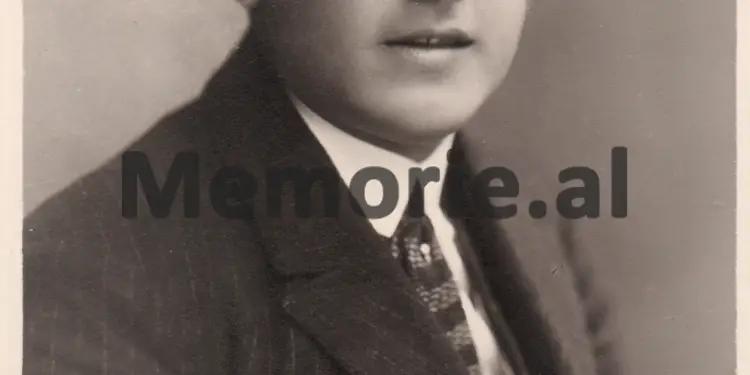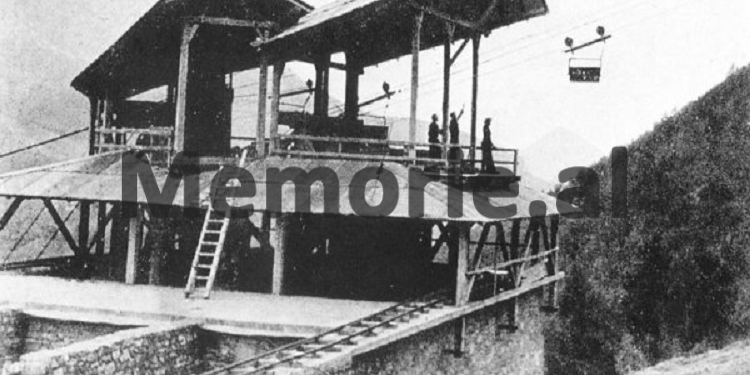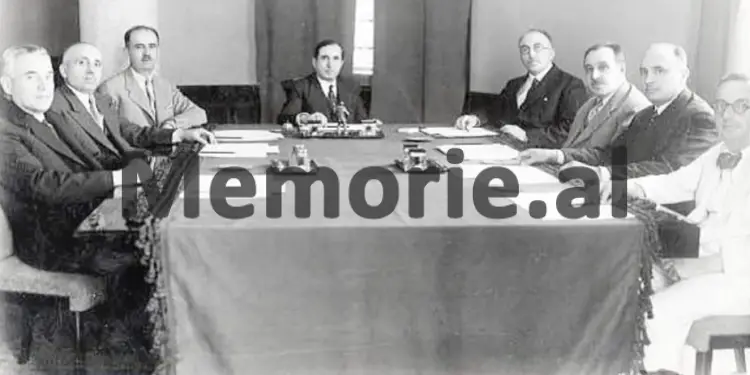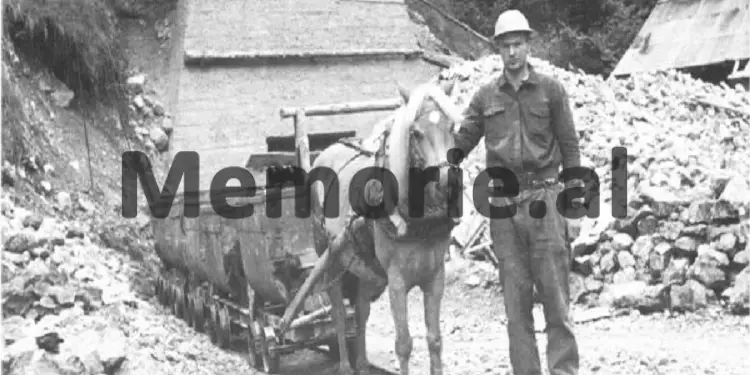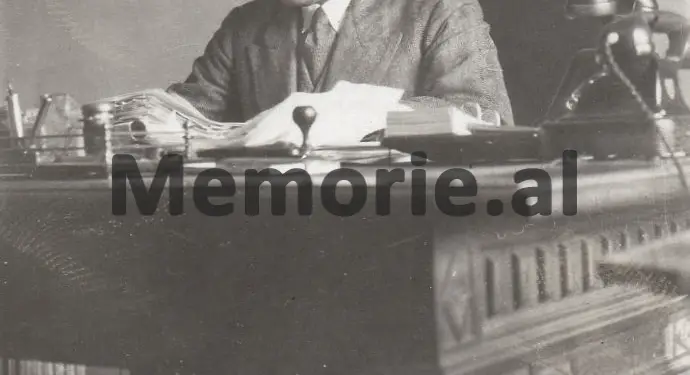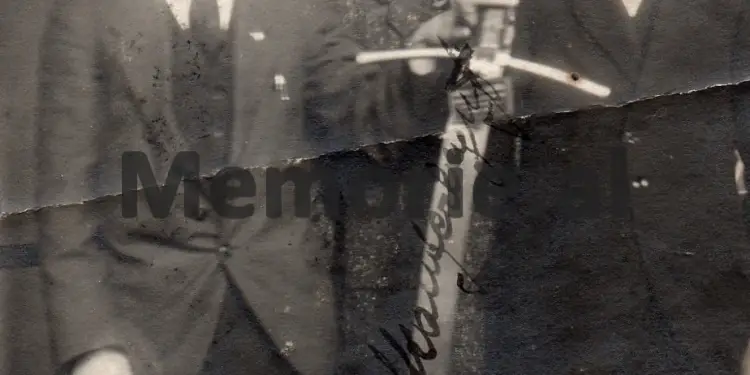By Arben Pustina
Part eleven
-Rrok Gera, a proper statesman –
FORWARD
Memorie.al / This book aims to convey to the public the image of a perfect man, who lived in other times, but who was the best example, not only of what an ordinary man can represent, but, next first, as an example of a noble, distinguished, omniscient and, above all, honest statesman. Having in his genes the noble virtues of his origin, being formed as a personality in a wonderful environment, such as Shkodra at the beginning of the 20th century, and graduating from one of the most prestigious universities in Europe, such as that of In Vienna, Rrok Gera had all the potential to be one of the important figures who gave rise to a rapid development through comprehensive reforms in Albania in the 30s of the last century.
This development reached its peak with the government of Mehdi Frashër, considered perhaps the best Albanian government of all time, formed for the most part by non-political persons, among who was Rrok Gera. For 10 years, or more, as a minister or in other high state functions, he worked with conviction that he was walking on the right path for the consolidation of the Albanian state, a process for which he said he had no time to lose. Economist, financier, diplomat, lawyer, Gera was a specialist who advanced towards the top with his professionalism in an environment where the old factions, which were almost dominant in politics and governance, lost ground in front of young and educated people good.
MINISTER OF NATIONAL ECONOMY IN THE GOVERNMENT OF KOÇO KOTA
In another letter addressed to the Presidency of the Council of Ministers, on February 17, 1939, Minister Gera announced that the Legation in Rome had informed our Ministry of Foreign Affairs that he had not made any effort to obtain the permits in question, but also considered that the efforts required by the Ministry of National Economy to issue permits did not match what this Legation estimated it should do. Legata even suggested to the Ministry to enter into talks with the E.I.A.A., regarding the Albanian wool exports to Italy. Finally, after the middle of February 1939, the Ministry of Foreign Affairs, sent to the Ministry of Economy, a list of export permits, but even that list was partial, since there were only permits for a number of export goods, or permits for quantities small.
Once again, in his letter no. 385, dated February 20, 1939, Rrok Gera begs the Foreign Ministry to encourage our Legation in Rome to ask for more permits, especially for skins, wool and olives, because otherwise, the Albanian economy was at risk of crisis. Regarding the new trade agreement with Italy, our diplomatic representative in Rome informed the Presidency of the Council of Ministers through the Ministry of Foreign Affairs, that during the talks there, Italian officials had stated that the issue of premiums was considered closed, as the Albanian government had officially given up on them. Asked by the Albanian diplomat, if he considered the fact of denouncing the Agreement with E.I.A.A. as a withdrawal from the favors enjoyed by Albania, prof. Ciucci had stated: …” It is not only the denunciation of the agreement with the EIAA, but it is a letter for the renunciation of the Albanian Government in these rights, a letter that the Ministry of National Economy (Mr. TOÇI) gave to the Italian Legation, when I laughed at Tirana…!
Persisting in his work, our diplomat had asked the Italian official, perhaps he was confusing the case with the letter of the Ministry of National Economy for waiving the premium for wool and fish (Confidential letter dated February 25, 1938), but the Italian he had said no, because it was about something else. And in fact it was about the letter of October 28, 1937, by means of which the convention with the E.I.A.A. was denounced. Meanwhile, our representative in the Legation of Rome, assessed in his letter to the Foreign Ministry, that the matter should be well clarified, since Albania could thus lose many economic advantages obtained with much effort, therefore, regarding the denunciation of the convention with E.I.A.A., he requested the authorization of the Ministry, during the official negotiations with the Italian authorities, to declare that the Royal Government had no knowledge of it, or to say that the Government had not approved such a letter or action. The assessments of our diplomat in Rome on the matter remind us of the conclusions reached by Gera in July 1938 (and which he informed the Council of Ministers), according to which, the denunciation of the convention with E.I.A.A. had practically only caused the cancellation of Albanian interests and not the cancellation of the mediation of the E.I.A.A., so the action taken in 1937 by his predecessor was completely irregular and incompatible with the preservation of the state’s interests.
Returning to the issue of permits, we have another letter from Gera, with no. 385/5, dated February 25, 1939, where the Minister of National Economy requested more commitment from the Legation in Rome for Albanian export permits: “…all care must be taken, making the necessary inquiries to the authorities there for the issuance of permits and especially those for wool, skins for full quantities, sardines, eggs and live livestock, which have not been issued permits this whole semester, otherwise the damage to the economy of our country will be very great “. Regarding a possible new agreement with Italy, Rrok Gera instructed the Legation, in its efforts for the realization of this agreement, to focus on what was required by the decision of the Council of Ministers of December 31, 1938 and not to be distracted by different ideas. It was important for Gera that Albanian exports were based on the criterion of free trade through the distribution of permits to as many Italian firms as possible: ……”it is true that the Albanian merchant, like any other merchant, has no other value than who buys the goods, but at the same time wants to know that the purchase price will be based not on the price of a person, or Society, but on a sound criterion, on which every other merchant is based, that is, on the free market, that without knowing that how will you sell, can’t know how to buy. This is very well demonstrated by the experience of the past two years. In 1937, when fur licenses were granted to other Italian traders besides the E.I.A.A., prices were lowered from 90 Fr. gold quintal that E.I.A.A. offered, with 150 and 160 Fr. gold quintal”.
But everything that happened regarding our exports to Italy seems to have been the prelude to something much more serious, such as the Italian invasion of Albania, which would be realized in a few weeks. Rome’s attitude regarding the relations with Albania during the last months showed nothing but impudence and arrogance…! Anyway, as we saw, Rrok Gera did his duty, with dedication, with persistence, almost every day in constant contact with the Presidency of the Council of Ministers, with the Ministry of Foreign Affairs, or with our Legation in Rome, encouraging others to insist, to demand, to put the responsible before the responsibility, to achieve as much as possible, the best in favor of the Albanian economy. The activity of another Italian company in Albania, A.M.M.I., was expanding and, at the end of August 1938, it was in the phase of searching for mineral-bearing areas. From these researches, it emerged that in some areas of Pogradec, there was a high chromium mineral content. From the calculations and analyzes made in the country by the Ministry of National Economy, it resulted that A.M.M.I. had a profit calculated from 16.10 fr. gold, up to 26.10 fr. gold per ton and, therefore, was more profitable.
In September 1938, talks were held between the representatives of the Italian company and the representative of the Albanian government, the Minister of National Economy, Rrok Gera, regarding the conditions for granting the concession to A.M.M.I. On September 6, the Italian representative of A.M.M.I. submitted to Gera the request for the exclusive search for chrome ore and its companions throughout Albania. The research expenses were to be borne entirely by the A.M.M.I. company, which claimed to be exempt from all taxes and duties, as well as demanding the right, that any company that would later receive the right to the industrial processing of the extracted minerals, paid her an expense allowance. Also, A.M.M.I. demanded that the damage that could eventually be caused to third parties be taken over by the Albanian government, which would have the right to pass it on to companies that could later be involved in the industrial processing of minerals. Always according to the Italian representative, the Albanian government would have the right to participate in the profits, with a quota of no more than 35%.
This quota could be replaced, with the consent of the parties, by a right to each ton of mineral exported. On September 9, 1938, after having analyzed the demands of the Italian side, on behalf of the Albanian government, the Minister of National Economy, Gera, declared to the representative of A.M.M.I., that the Albanian government was ready to grant the concession to this company, but only for the area of Pogradec and that of Kukës. Meanwhile, Rrok Gera requested that, for the development of A.M.M.I.’s activity in these areas, an Italian-Albanian company should be created, a quota of whose capital would be given to the Albanian state for free. For the administration of the company in question, for the control of the production and sale of the mineral, special provisions would be set. As for the proposal for the Albanian government to pay off payments for damages to third parties, Gera emphasized that this was unacceptable. For various reasons, the talks held in September 1938 were only able to be completed on March 29, 1939, with the granting of the concession to A.M.I. for research and exploitation of chromium and its companions in the entire Albanian territory, but this on the condition that Italian capital to create an Italian. Albanian company with an initial capital of 500,000 fr. gold, which would be called A.M.I.A. (Italo-Albanian Mineral Enterprise).
A.M.M.I.’s capital in this company amounted to 51%, while the Albanian state had 49%. As is easily understood, this was the case of granting a well-negotiated concession, which resulted in benefits for the Albanian state and the country in general and which was reached after studies and complete analyses. Going back a little in time, we see that in its issue of June 29, 1938, the newspaper “Drita” commented on a working visit made at that time to the Shkodra area by the Minister of the Interior and the Minister of National Economy (Gera):… “In no case, the arrival of ministers among us, such as that of Mr. Minister of the Interior and National Economy, who came to Shkodra on Saturday with 25 of his followers, does not attract the public’s interest they returned on the 26th. Never has a ministerial visit raised the greatest hope of benefit for the country. Both the Minister of the Interior, who temporarily leads the Ministry of World Affairs, as well as the Minister of Economy, had warned of their arrival. Mr. Minister of National Economy, Rrok Gera, with his findings, ordered the opening of the necessary credit from the funds available to the Department of Economy, for the systematization of these rivers. The Minister of National Economy also visited the road that is being built from Boga to Theth. After this action, the two ministers returned to Tirana, to leave the best impression on the people for their interest in the main needs of the country and for the provisions they gave, to carry out a large part of these needs…”.
Even the newspaper “Java” appreciated the visit of two young ministers to the field, giving it as an example for other members of the government: “Our ministers would do very well if they often visited the provinces of the Kingdom. This would help them solve many issues of the provinces, which either does not reach the center, or reach them deformed. There are many issues that are presented to the center as big problems, while in reality they are not and can be solved even with an order…”! But the visit of the two ministers to Shkodër was not something of a propaganda character, or just a formality. On the pages of the press of the time we have information about plans and studies for the water system in the area of Shkodra. Thus, the “Java” newspaper, in its issue of July 4, 1938, wrote that: The Ministry of National Economy was working intensively on reclamation and sewerage issues, so Professor Carrante was called again, who was expected to present to them to the Minister and Deputy Minister of the National Economy, his proposals at the end of the studies done:… “As we are informed, with the Water Directorate, the Ministry is carrying out and preparing to carry out a series of very important works in all the provinces of the Kingdom. These works that are being carried out, or that are being studied to be carried out, are partly done with state funds and partly with the help of the people”.
Yes, according to “Java”, the very fertile field of Trush, in the area of Shkodra, was the subject of a study for a sewage system to realize the rapid withdrawal of water after the floods that often occurred in that area. The newspaper also wrote about the many damages caused by the Drin River in fertile areas of Shkodra, such as: Stajkë, Ashtë, Beltoje and the entire Trush plain. According to “Java”, the relevant studies for the systematization of these areas had been completed and it was concluded that a water-receiving dam with a length of 8 kilometers should be built, at such a distance from the edge of the Drin River that the river would have the opportunity to expand in cases of multiple feeds. Also, the possibility of host water for saving the Zadrima field from the waters of the Gjadër River was being studied. It seems that these projects and works for water systems, sewerage and reclamation, would not only be an aspect of the work of the Ministry of National Economy, but would be, in the future, one of the main directions of the work of this department. This work was undertaken so diligently that in mid-July 1938, the Ministry held a meeting with its senior structures, where, under the direction of Minister Gera, it was discussed about the reduction and adjustment of the personnel of the department as well as the reduction of some funds in order to increase, as much as possible, the funds for reclamation works.
In the meeting, it was emphasized that, for the regulation of the personnel of the Ministry, professional training would be the basic criterion for retention. So, one way and two jobs: the incompetent employees were removed and additional funds were collected for bonuses. In the summer of 1938, the Ministry of National Economy intervened to protect the interests of producers and to prevent speculation by traders at plowing time. Again, the newspaper “Drita”, which mostly reflected the activity of the Ministry of National Economy, wrote sympathetically in its issue of July 3, 1938, regarding this measure, which was taken to protect local wheat producers: “…. The Royal Government taking into account the speculations that are usually made at the time of plowing by various traders, decided to intervene to protect the interests of the producers. With this principle, the Council of Ministers, after the proposal of the Ministry of National Economy, which found a sudden shock in the price of wheat, from 18 gold francs that used to be the quintal, began to be sold from 14 gold francs, discussed the issue and decided taking appropriate measures to ensure the good price of wheat. The first measure was the doubling of the customs duty on wheat, which had been set a few months before, to 6 gold francs per quintal, and this change came into effect on June 21, 1938, and has the practical purpose of selling the country’s new wheat at reasonable prices and in favor of the farmer…”!
Later, in December 1938, the Ministry of National Economy saw fit to intervene again with a bill for the adjustment of the wheat and corn customs duty, in order to set things right once and for all, in a balance that it protected the interests of consumers and producers, as well as avoiding traders’ speculations. In the justifying report for this draft law, Minister Gera emphasized that the measures taken up to that time (which provided for excessively high customs taxes on cereals), with the aim of protecting producers, had very little practical value, because, when in the country a lot of grain was produced, in the absence of an organization capable of maintaining a good domestic price, prices fell due to competition among producers. In the other case, when production was scarce, it was the government that intervened by lowering customs duties in order to ensure lower prices for the consumer.
Meanwhile, this measure harmed the producer, who had the most expensive grain because of the expenses, which were the same as in the case when there was a lot of production. Noting that the problem was not easy to solve (since speculators who imported large quantities of grain at a time of low customs duties and sold them at a high price at a time of high duties were a separate problem), Rrok Gera asserted that , in order to achieve a balanced price for cereals, the “mobile tax” (eshelle mobil) had to be used, on the basis of which the customs tax was calculated in relation to external prices, so that the price of imported wheat came to Albania (with all expenses) with about 20 fr. quintal and that for corn around 13.50 fr. quintal. During the debate in the Parliament, held on January 25, 1939, Gera expressed the belief that with this measure, the government responded to the needs of consumers and the demands of producers and avoided speculation. Memorie.al




